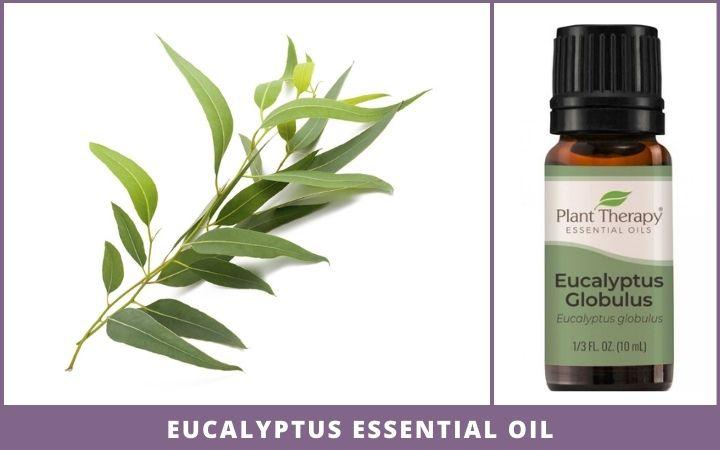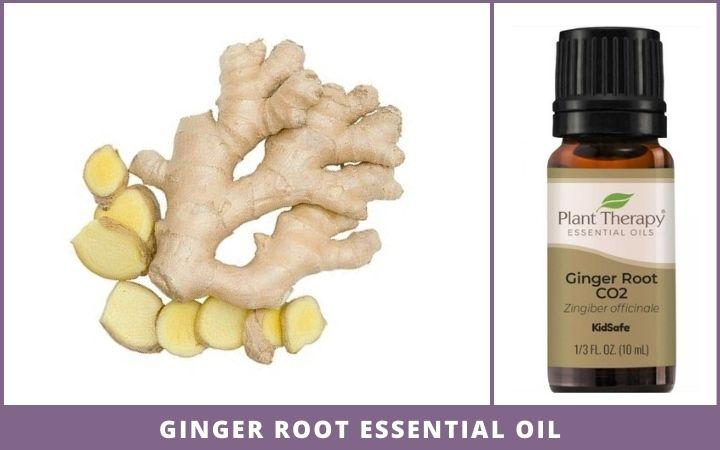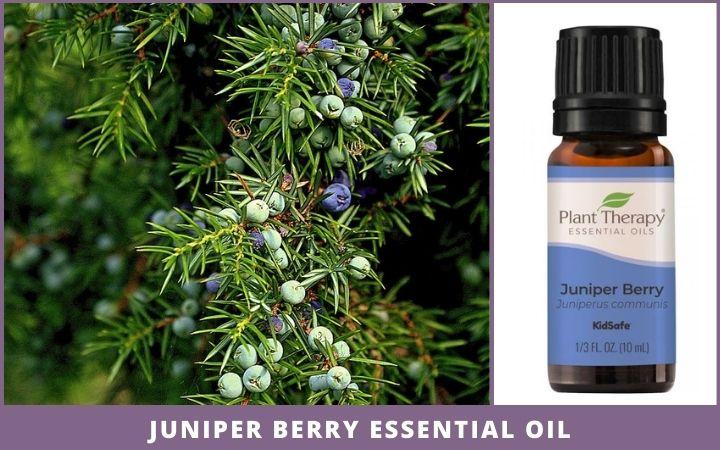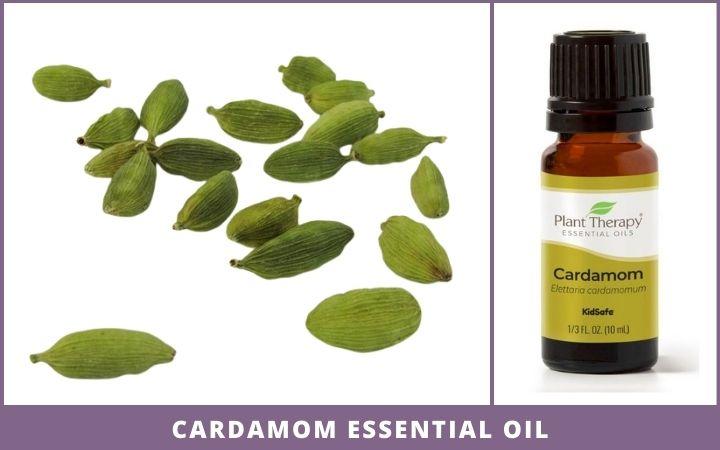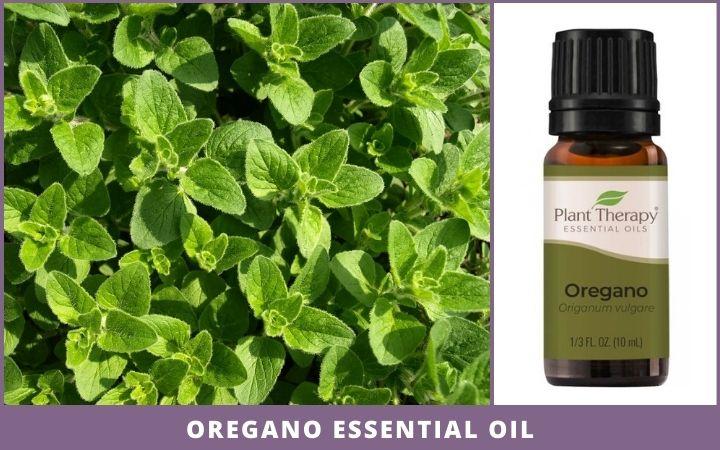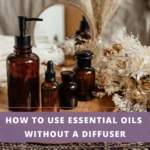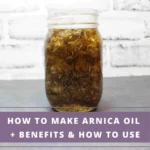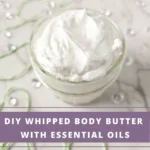As an Amazon Associate I earn from qualifying purchases. See Full Disclosure Here
While all essential oils have therapeutic properties, some oils have properties that are especially beneficial during the winter season. The best essential oils for winter are those that have warm, spicy aromas and specific properties that help overcome illnesses that are common at this time of the year.
As the winter season envelops us in its chilly embrace, it brings with it a unique set of challenges to our well-being. The cold weather, dry air, and short dark days increase our susceptibility to colds and flu, trigger SAD symptoms, and wreak havoc on the skin.
Fortunately, nature provides us with a powerful arsenal to combat these cold-weather woes – winter essential oils.
Why Use Essential Oils For Winter Wellness?
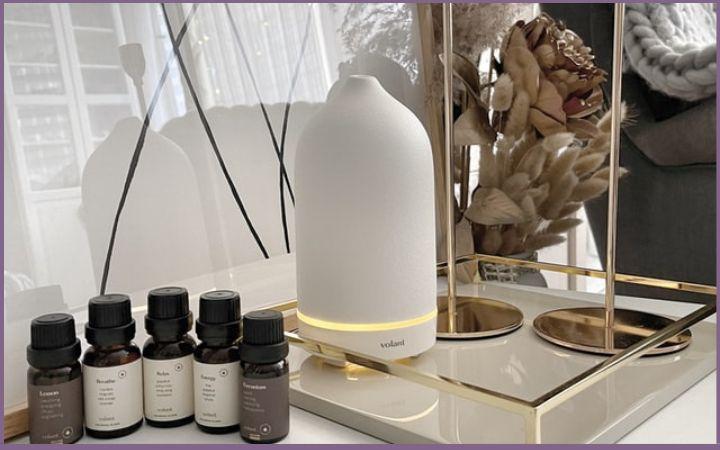
Essential oils are concentrated extracts of plants that have a variety of therapeutic properties. They can be used in diffusers, baths, massages, and DIY products to improve your mood, boost your energy levels, and support your immune system.
Essential oils offer a natural and holistic approach to winter wellness, providing a range of benefits that make them indispensable during the colder months.
Immune Support: Essential oils such as tea tree, eucalyptus, and cinnamon bark are renowned for their immune-boosting properties. These oils contain compounds that have antimicrobial and antiviral effects, helping to fortify your body’s defenses against seasonal illnesses.
Respiratory Relief: The dry and cold air of winter often brings respiratory challenges, including congestion and discomfort. Eucalyptus and peppermint oils, with their decongestant and soothing properties, can provide relief from nasal congestion and promote clear breathing.
Mood Enhancement: The winter blues, also known as seasonal affective disorder (SAD), can affect many individuals during the colder months. Essential oils like lavender and frankincense have mood-enhancing qualities that can help alleviate stress, and anxiety, and promote a sense of calm and relaxation.
Combating Dry Skin: Cold weather often leads to dry and irritated skin. Frankincense and ginger oils, when added to skincare routines or applied with carrier oils, can moisturize and nourish the skin, providing relief from winter dryness.
Natural Energy Boost: The invigorating scents of oils like peppermint and ginger can provide a natural energy boost, combating feelings of fatigue that may accompany the winter season. Diffusing these oils or applying them topically can help revitalize both the body and mind.
Creating a Cozy Atmosphere: Beyond their therapeutic properties, essential oils contribute to creating a warm and inviting atmosphere indoors. The aromatic notes of cinnamon, ginger, and other winter-friendly oils can transform your living space, fostering a sense of comfort and well-being.
Holistic Wellness Approach: Essential oils offer a holistic approach to wellness, addressing not only physical symptoms but also supporting emotional and mental well-being. The natural compounds found in these oils interact with the body in multifaceted ways, promoting overall health and balance.
The aromatic allure and therapeutic benefits of essential oils make them a valuable addition to your self-care arsenal, helping you embrace the winter months with resilience and vitality.
TOP ESSENTIAL OILS FOR WINTER WELLNESS
1. Eucalyptus
Known for its invigorating scent and decongestant properties, eucalyptus is a must-have winter essential oil. If you buy just one essential oil in winter, let it be eucalyptus.
Eucalyptus is the best essential oil for clearing sinus congestion and other respiratory problems, which are common during this season.
Regular steam inhalations with 2-3 drops of eucalyptus essential oil help to clear nasal passages and flush out harmful airborne bacteria.
Diffusing eucalyptus essential oil in winter can help boost immunity and strengthen your defenses against the cold and flu.
Inhaling the aroma also promotes healthy circulation, bringing a feeling of warmth to the body. It also helps to relieve mental exhaustion and stimulates mental focus.
27 ways to use eucalyptus essential oil for winter wellness
2. PEPPERMINT
Peppermint essential oil is a versatile winter warrior. Its antimicrobial properties make it a valuable tool in the fight against winter bugs.
It also helps ease congestion brought on by the cold and flu, both of which are common in winter. If you’re prone to getting a cold or flu, keep a personal inhaler with peppermint oil with you at all times.
What makes peppermint a great essential oil for winter wellness is its powerful pain-reducing properties. This is one of the best essential oils for pain, whether it is from winter inflammation, holiday stress, or muscle aches that are common during this season.
Peppermint is also one of the most energizing and invigorating of all essential oils. Inhaling the aromas of peppermint essential oil will keep you energized, which is perfect for perking you up during the dark, dreary winter season.
Health benefits of peppermint essential oil
3. FRANKINCENSE
Often referred to as the ‘king of all oils’, frankincense contains a blend of monoterpenes that get metabolized quickly in the body. This makes frankincense a great oil to use when you want to see results quickly.
Frankincense essential oil has powerful anti-inflammatory properties. Putting a few drops in your diffuser will help boost your immune system and make you less susceptible to dreaded winter illnesses such as the cold and flu.
The earthy aroma of frankincense essential oil provides emotional support and enhances feelings of relaxation and well-being while its grounding and uplifting qualities work well for reducing SAD symptoms during the winter months. Diffuse it or add a few drops to your skincare routine to combat dry winter skin.
Frankincense also helps support the nervous system and taps into our relaxation response so you feel less anxious and depressed. This is one of the most effective oils for promoting a feeling of peace, satisfaction and overall wellness during winter.
3. Tea Tree Oil
Derived from the leaves of the Melaleuca alternifolia tree, tea tree essential oil is a versatile and effective ally in promoting winter wellness. Known for its powerful antibacterial, antiviral, and antifungal properties, tea tree oil offers a range of benefits that can help you stay healthy and resilient during the colder months.
Tea tree essential oil is a natural powerhouse with proven antimicrobial capabilities. Its active compounds, such as terpinen-4-ol, work to fortify the immune system, providing a robust defense against common winter threats like colds and flu.
Its anti-inflammatory properties may help alleviate congestion in the airways, making it easier to breathe comfortably, especially when dealing with winter-related respiratory issues.
Tea tree oil’s ability to combat viruses makes it a valuable tool in preventing the onset of colds and flu.
Beyond its immune and respiratory benefits, tea tree oil can address skin issues that may arise during the winter. Its antiseptic properties make it effective in treating minor skin irritations, cuts, and blemishes. Diluting tea tree oil with a carrier oil and applying it topically can contribute to healthier skin, which may be prone to dryness in colder weather.
Best essential oils for immune system support
4. CLOVE

Clove essential oil belongs to the spicy aroma family. It has a warming and invigorating aroma, which helps counteract the lethargic feeling that winter brings. Its strong scent has an uplifting effect on the mood and promotes mental clarity and focus.
Inhaling the aroma of clove essential oil will lift you out of the doldrums and help you feel more focused and energetic. It also has powerful healing and disinfectant properties, making it a versatile oil to use in winter.
Mix a few drops of clove oil with a carrier oil and massage gently over the bottom of your feet to get the benefits of clove oil in winter.
Clove essential oil benefits, uses, & cautions
5. CINNAMON BARK
Cinnamon bark essential oil also has an intense warming, invigorating aroma that is both exotic and comforting. It is reminiscent of baking all kinds of goodies during the Holiday season.
Diffusing cinnamon bark essential oil during winter is comforting and uplifting. It alleviates feelings of stress and promotes relaxation, making it easier for you to get a more restful night’s sleep. This is so important during winter. A good night’s sleep is key to staying energetic, uplifted, and focused during the day.
Meanwhile, its antibacterial properties can help protect against seasonal illnesses. Blend it with other oils or diffuse it to create a cozy and festive atmosphere indoors.
Cinnamon essential oil benefits, uses, & cautions
Cinnamon also tops the list of best Christmas essential oils
6. Helichrysum Essential Oil
As the chill of winter sets in, bringing with it the familiar companions of sniffles, coughs, and seasonal germs, helichrysum essential oil emerges as a potent defender of your well-being. Its potent antibacterial properties make this essential oil a valuable ally in the battle against winter ailments.
This remarkable winter essential oil has powerful antibacterial properties, making it a reliable aid in fighting off common colds, coughs, and infections that often surface during the colder months. Its natural antimicrobial qualities can contribute to a strengthened immune response, helping you stay healthy and protected throughout the season.
In addition to its ability to combat winter-related illnesses, Helichrysum essential oil provides respiratory support by addressing inflammation in the airways and nasal passages. This becomes particularly beneficial when faced with the challenge of taking deep breaths in the cold.
Helichrysum essential oil not only targets physical symptoms but also contributes to a holistic approach to wellness. Its aromatic profile adds a pleasant note to your surroundings, creating a soothing ambiance that supports not only your respiratory health but also your overall sense of well-being.
7. GINGER
Known for its warming properties, ginger essential oil can be a comforting ally during the cold season. Its woody, spicy, earthy aroma can help alleviate feelings of fatigue and provide a natural energy boost. Add a drop or two to a carrier oil and massage onto sore muscles for relief.
It is one of the best essential oils for managing sudden mood fluctuations that are frequently seen in winter, especially among those who are susceptible to SAD symptoms. Inhaling the aroma of this oil also lifts your spirits and clears mental fog so you can stay more focused and get things done.
8. Juniper Berry
Extracted from the berries of the Juniperus communis tree, juniper essential oil possesses a myriad of properties that make it a valuable addition to your winter wellness toolkit.
Juniper Berry oil is renowned for its ability to provide respiratory support during the winter months. Its antiseptic and expectorant qualities can help ease congestion in the chest and sinuses, making it easier to breathe freely.
Packed with antioxidants, Juniper Berry oil supports a robust immune system, which is particularly crucial during the winter when immune challenges are more prevalent.
Known for its calming effects, the oil can help alleviate stress and anxiety, promoting a sense of relaxation and winter.
During winter, when indoor environments can feel stagnant, diffusing Juniper Berry oil can act as a natural air purifier, helping to cleanse and refresh the air. This not only supports respiratory health but also contributes to an overall sense of vitality.
When diluted and applied topically, the anti-inflammatory and analgesic properties of juniper oil work to help ease discomfort and soothe aching joints and muscles.
The invigorating and uplifting aroma of juniper can lift your spirits during the darker, colder days of winter and help beat the winter blues. Diffuse the oil to create a cheerful ambiance, helping to combat feelings of lethargy and melancholy that can accompany the season
9. Cardamom
Cardamom essential oil brings a delightful aromatic profile and therapeutic properties that make it a valuable addition to your winter self-care routine.
It is also known for its ability to promote respiratory health. Its expectorant properties can help ease congestion, making it particularly beneficial during the winter months when colds and respiratory challenges are common.
Rich in antioxidants, cardamom essential oil contributes to a resilient immune system. During winter, when immune defenses may be tested, incorporating this oil into your wellness routine can provide a natural boost.
Known for its carminative properties, it can help alleviate indigestion, bloating, and discomfort. Inhaling the aroma or diluting and applying the oil topically over the abdomen can offer digestive relief.
Combat the winter chill with a warming massage using diluted Cardamom oil. Blend it with a carrier oil and gently massage onto the skin. The oil’s warming properties can provide relief to tired muscles and contribute to a sense of physical comfort.
10. Oregano
Oregano essential oil possesses potent antibacterial, antiviral, and immune-boosting properties, making it an excellent addition to your winter health toolkit.
The leaves of the oregano herb are rich in carvacrol, a compound with robust antimicrobial properties. Incorporating this oil into your routine can provide significant support for your immune system, helping to fend off winter-related illnesses.
Its expectorant properties can help clear congestion and support respiratory health. Inhaling the vapor of Oregano oil, either through diffusion or steam inhalation, can provide relief for symptoms associated with colds and flu.
The potent antibacterial properties of oregano essential oil make it a valuable tool for disinfection. Use it in a DIY natural cleaner to sanitize surfaces and eliminate germs in your living space. This not only contributes to a cleaner home environment but also aids in preventing the spread of winter illnesses.
During the winter months, hearty meals and holiday indulgences can sometimes lead to digestive discomfort. Oregano oil, with its carminative qualities, can aid digestion and alleviate bloating. Dilute the oil with a carrier oil and massage it onto the abdomen for soothing relief.
The antiviral properties of Oregano oil make it an effective ally in defending against common winter viruses. Incorporate it into your wellness routine when you feel the onset of symptoms or as a preventative measure during peak cold and flu seasons.
If the winter weather exacerbates joint or muscle discomfort, consider using Oregano oil topically. Dilute it with a carrier oil and massage it onto areas of discomfort for its anti-inflammatory and analgesic effects.
Research-backed benefits of oregano essential oil
How to Use Essential Oils for Winter Wellness
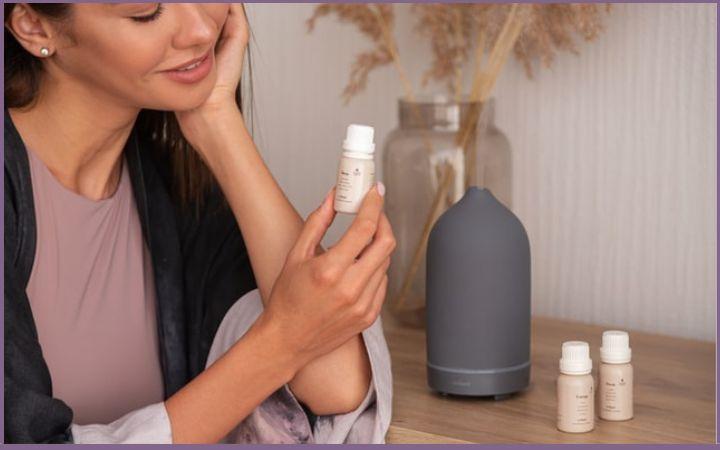 There are a few different ways to use essential oils for winter wellness. Here are a few ideas:
There are a few different ways to use essential oils for winter wellness. Here are a few ideas:
– Diffuser: Add a few drops of essential oil to a diffuser and inhale the vapor. This is a great way to improve your mood, boost your energy levels, and clear your sinuses.
– Bath: Add a few drops of essential oil to your bathwater and soak for 20 minutes. This is a great way to relax your muscles and improve your sleep quality. How to use essential oils in the bath the right way.
– Massage: Dilute essential oil with a carrier oil and use it for a massage. This is a great way to relieve muscle pain and stress.
– DIY products: You can use essential oils to make your own DIY products, such as lip balm, lotion, and cleaning sprays.
25 ways to use essential oils without a diffuser
Tips for Using Winter Essential Oils Safely
Here are a few tips for using essential oils safely:
Always dilute essential oils with a carrier oil before applying them to your skin.
Do not ingest essential oils.
Avoid contact with your eyes and mucous membranes.
If you are pregnant, breastfeeding, or have a medical condition, consult with your doctor before using essential oils.
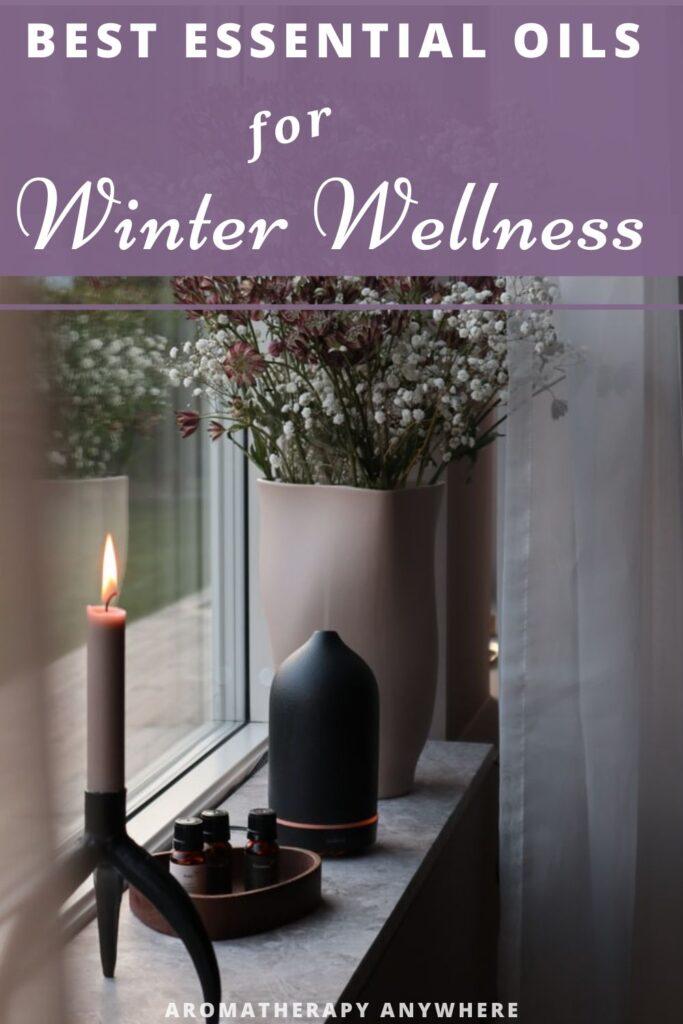 Disclaimer: This information is not intended to serve as medical advice. Please consult your doctor before using any natural medication or if you experience any unusual symptoms. See Full Disclaimer here.
Disclaimer: This information is not intended to serve as medical advice. Please consult your doctor before using any natural medication or if you experience any unusual symptoms. See Full Disclaimer here.

